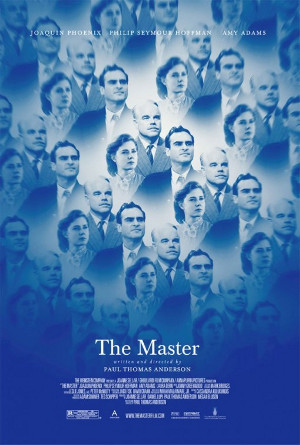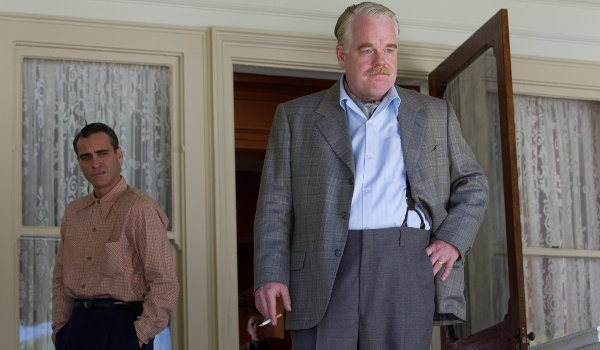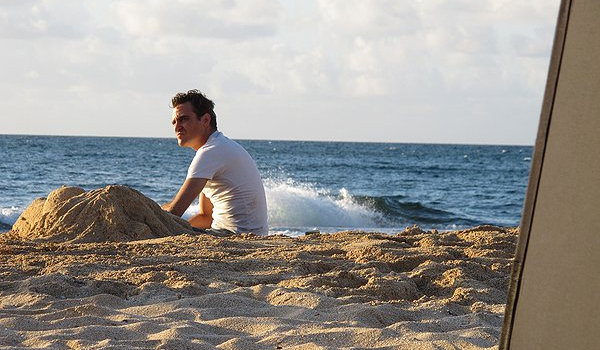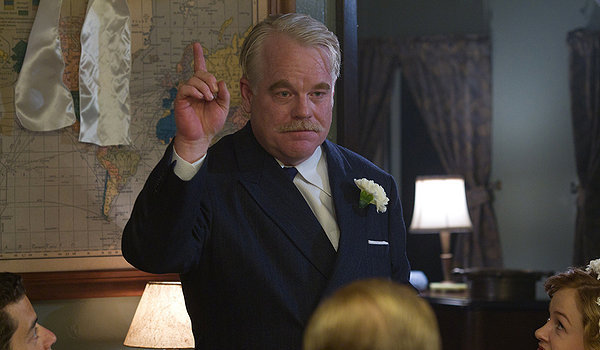- Title: The Master
- IMDB: link

 It’s only September, but it’s quite possible the latest film from writer/director Paul Thomas Anderson may be the best collection of acting seen in theaters this year. The Master, inspired (in part) by L. Ron Hubbard and the rise of Scientology, is a terrifically produced look into the life of a disturbed young man and his relationship with the leader of a cult.
It’s only September, but it’s quite possible the latest film from writer/director Paul Thomas Anderson may be the best collection of acting seen in theaters this year. The Master, inspired (in part) by L. Ron Hubbard and the rise of Scientology, is a terrifically produced look into the life of a disturbed young man and his relationship with the leader of a cult.
The film is less concerned about the specific inner workings of a cult than what kind of life it’s leader might live and how he might react to those around him and those in need of his help.
When we meet Naval Officer Freddie Quell (Joaquin Phoenix) in the final days of WWII it’s obvious there’s something very wrong with the man whose violent and blunt interactions with everyone he meets fail to earn him friends. After the war, Freddie travels around the country in various jobs, including a department store photographer and field hand – both of which he’s forcibly removed from due to his poor judgement.
By happenstance, he finds himself stowed away on the yacht of Lancaster Dodd (Philip Seymour Hoffman) and his immediate family (Amy Adams, Jesse Plemons, Ambyr Childers, Rami Malek) and followers. Dodd immediately takes a shine to the troubled Freddie (and his bootleg moonshine made from whatever chemicals Freddie finds lying around) and offers him an opportunity to learn more about their movement.
Although Freddie enjoys Dodd’s company, it doesn’t take him long to see the man at least as much a swindler as the great intellectual he presents himself as. However, that doesn’t stop Freddie from wanting to believe, and Dodd’s genuine affection for Freddie makes him honestly want to help his new friend. The charismatic leader of an intellectual and spiritual movement who most refer to only as “The Master” finds his fate intertwined with a man whose selfishness and self-delusion are a perfect match for his own.

Although both are obviously attracted to women, there is an undeniable homo-erotic tension in the passionate co-dependent relationship between Dodd and Freddie that frightens Dodd’s wife (Adams) and excites his daughter (Childers). Much like Anderson’s last film, There Will Be Blood, The Master is a character study of a single relationship between two extremely flawed individuals. It’s this relationship that delivers the movie’s most memorable scenes including a jailhouse shouting match, and the first session between The Master and his latest pupil.
Every choice Anderson makes in the film is to the benefit of the performances, but not necessarily to that of the story. As the performances drive the film at times the director holds shots to showcase the terrific portrayal of the actors in ways that don’t always serve the narrative. This creates, at times, for some awkward sequences and editing. The film’s score is also often jarring and distractingly obvious, at times even bordering on condescending. The director certainly hasn’t gotten any more subtle with his music cues.

The film also plays loosely with reality, hypnosis and suggestion, and hallucination. There are several moments, presented from Freddie’s point of view, that bring into question how damaged the young man really is and how much of what he perceives is really happening. The two most obvious instances of this are a party where the female members of the cult may, or may not, be attending nude and an unlikely (bordering on omnipotent) phone call in an empty theater. Some viewers may find this frustrating, but Anderson certainly leaves many such sequences open-ended allowing for multiple interpretations.
The Master is about a charismatic leader of a cult and his followers and yet there are, surprisingly, no true believers shown on-screen. As this is the case one has to wonder, just how charismatic is The Master supposed to be? Everyone from The Master, to his immediate family, to Freddie, understands the con that is serving the man’s ego and pocketbook. While that doesn’t mean there isn’t genuine concern and love among the group, it is a very cynical take when even a man of such obvious charm can’t stand even the slightest criticism without boiling over in out of control rage the rivals Freddie or charm anyone for very long (which also leads to a problematic disconnect with the film’s final 15-minutes).

And the film’s final act is a problematic as Freddie’s attempt to reconnect with his past and his restart his unseemly romance of a young girl (Madisen Beaty) leads to an interesting but ultimately empty final 15-20 minutes that doesn’t have much to say (and doesn’t include death by bowling pin to help smooth over the lack of overall message or emotional payoff).
Magnolia, still my favorite of Anderson’s films, focused on large ensemble cast of damaged and sympathetic characters whose various failings made you care about, and for, their limitations and outcomes. In comparison The Master, although artfully done, keeps the audience at arm’s length and never really attempts to engage the viewer on an emotional level.
It may not be everything I wanted it to be, with an ending that cares more about giving us yet another terrific scene between Freddie and Dodd than providing resolution, but The Master is an ambitious, well-crafted and excellently performed character study that should earn its share of statues come awards time (particularly for its two leads).
